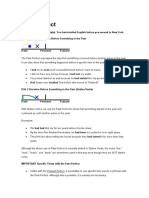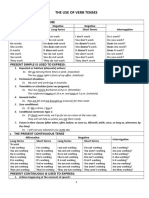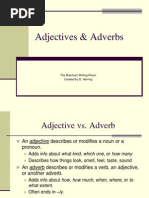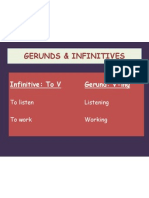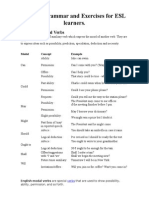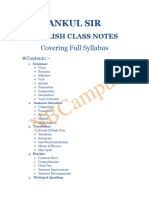Past Simple
Past Simple
Uploaded by
Cayo Eder FloresCopyright:
Available Formats
Past Simple
Past Simple
Uploaded by
Cayo Eder FloresOriginal Description:
Copyright
Available Formats
Share this document
Did you find this document useful?
Is this content inappropriate?
Copyright:
Available Formats
Past Simple
Past Simple
Uploaded by
Cayo Eder FloresCopyright:
Available Formats
PAST SIMPLE
Regular Past simple forms end in ed in the positive form. But many verbs have an
irregular past form.
Positive form
I/you/he/she/it/we/they
started
I/ you/he/she/it/we/they
won
Negative form
I/ you he/she/it/we/they
didnt start.
I/ you/he/she/it/we/they
didnt win
Question form
Did I/you/he/she/it/we/they
start?
Did I/you/he/she/it/we/they
win?
Did you play tennis last week?
4. action in the past taking place once, never or several times
o He visited his parents every weekend.
5. actions in the past taking place one after the other
o He came in, took off his coat and sat down.
6. action in the past taking place in the middle of another action
o When I was having breakfast, the phone suddenly rang.
7. if sentences type II (If I talked, )
o If I had a lot of money, I would share it with you.
Exception! The verb to be is different. We conjugate the verb to be (I was, you were,
he/she/it was, we were, they were); and we do not use an auxiliary for negative and
question sentences. To make a question, we exchange the subject and verb.
o
o
o
was at work yesterday.
We were not late (for the train).
Were you angry?
8. The action can be short or long, single or repeated.
o I dropped the glass and it broke on the floor.
o He took the train to work every day.
9. We also use it to talk about states in the past.
o When I was young, I loved playing with my toys.
10. Note that when we tell a story, we usually use the simple past tense. We may
use the past continuous tense to "set the scene", but we almost always use
the simple past tense for the action. Look at this example of the beginning of
a story:
We use the Past simple to talk about a finished action or state in the past. It can be
something that happened once or many times. We often say when it happened.It is
at a specific time.
o
o
o
He died in 1980 (= once)
My father always took me to school when I was young (= many times)
We lived in a very small huse in those in those days (= state)
We use the simple past tense when:
1.
2.
3.
the event is in the past
the event is completely finished
we say (or understand) the time and/or place of the event
Examples:
o I lived in that house when I was young.
o He didn't like the movie.
o What did you eat for dinner?
o John drove to London on Monday.
o Mary did not go to work yesterday.
"The wind was howling around the hotel and the rain was pouring down. It
was cold. The door opened and James Bond entered. He took off his coat,
which was very wet, and ordered a drink at the bar. He sat down in the
corner of the lounge and quietly drank his..."
Time phrases often used in the past: at, on, in, ago, the other day
at, on, in
We can use these time phrases in the present and future.
at + time/two/ three days at 12.15
at eight oclock
at Easter at Christmas
on + day/date
on Monday on July 2nd
in + month/season/year
in winter
in spring
decade/century
in 1988
in the 1990s
in the twenty first century
We do not use a preposition with last and yesterday
We went there last year / yesterday
ago = before now
We use it to show how far in the past something happened.
o I first met Jackie two years ago
We do not use ago after specific time periods with the
o I met him in the summer ago.
I/he/she/it was
travelling
you/we/they were
travelling
Negative form
I/ he/she wasnt
travelling.
You/we/they werent
travelling.
6.30
Past
now
b. When another (completed) action happened.
I was driving along when I saw a friend of time.
Driving home
PAST CONTINUOUS
Positive form
Driving home
saw a friend
Question form
Was I/he/she/it travelling?
Were you/we/they
travelling?
The past continuous tense is an important tense in English. We use it to say what
we were in the middle of doing at a particular moment in the past.
Past Continuous Timeline
Past
now
2. We often use the P.C. to describe the background situation in a story.
For the main events, we use the Past Simple.
o The sun was shining and I was walking along the road.
Suddenly someone shouted to me
o " James Bond was driving through town. It was raining. The wind
was blowing hard. Nobody was walking in the streets. Suddenly,
Bond saw the killer in a telephone box..."
3. Sometimes the other action in the Past simple interrupts the action in
the P.C.
o I was crossing the road when I slipped on some ice. (= I stopped
crossing the road)
4. When two actions happen one after the other, we use the P.S. for
both actions.
o When I heard the crash, I ran to the end of the street.
Exceptions in Spelling
Exceptions in spelling when adding ing
final e is dropped (but: ee is not changed)
after a short, stressed vowel, the final consonant is
doubled
l as final consonant after a vowel is doubled (in
British English)
final ie becomes y
Example
come coming
(but: agree agr
eeing)
sit sitting
travel travelling
5. We use the P.c. for actions we see as incomplete
o I read a book about Italy. (= I read it all)
o I was reading a book about Italy on the plane. (=I probably didnt
read it all)
6. We use When, while and as to join P.C. and P.S. parts of a sentence
o I saw Karl when/while/as I was waiting at the bus stop.
lie lying
1. We use the Past Continuous to talk about actions in progress:
a. At a certain time in the past.
I was driving home at 6.30 this evening.
Similarities with other continuous forms
1. Continuous forms describe activities in progress.
o Hes reading the newspaper (=he`s in the middle of it)
o He was reading the newspaper (=he was in the middle of it)
2. We use continuous forms to emphasise that situations are temporary
o Shes staying with us at the moment (temporary in the past)
o I was sleeping on a friends sofa (=temporary in the past)
3. We do not use continuous forms with state verbs.
o I hated vegetables when I was young.
Not:
o I was hating vegetables when I was being young
Past Continuous Tense + Simple Past Tense
We often use the past continuous tense with the simple past tense. We use
the past continuous tense to express a long action. And we use the simple
past tense to express a short action that happens in the middle of the long
action. We can join the two ideas with when or while. In the following
example, we have two actions:
1. long action (watching TV), expressed with past continuous tense
2. short action (telephoned), expressed with simple past tense
We can join these two actions with when:
I was watching TV when you telephoned.
(Notice that "when you telephoned" is also a way of defining the time [8pm].)
We use:
when + short action (simple past tense)
while + long action (past continuous tense)
There are four basic combinations:
When
While
I was walking past the
car
the car exploded
The car exploded
I was walking past the
car
when
it exploded.
while
I was walking past it.
I was walking past it.
it exploded.
She was cooking when I telephoned her.
We were having dinner when it started to rain.
Ram went home early because it was snowing.
For example:
Q) "What were they doing yesterday?" A) "They were working all day."
It can be used to describe what someone was doing at a particular point in
time.
For example:
Q) "What were you doing at 7.30 last night?" A) "I was watching television."
The past continuous can also be used to show that an activity frequently took
place over a period of time.
Q) "What did you do on holiday?" A) "I went skiing a lot."
Often the past continuous is mixed with the past simple to show what was
happening when something happened. The past continuous refers to the
longer event and the simple past to the event that interrupted it.
For example:
"I was driving to work when I crashed my car."
or
As I was driving to work, I crashed my car."
PAST PERFECT
HAD + PAST PARTICIPLE
Positive form
I/he/she/it/we/theyd
(=had)finished
Negative form
Question form
I/ he/she it/we/they
hadnt finished.
Had I/he/she/it/we/they
finished?
Past Perfect Simple Timeline
Notice that the long action and short action are relative.
"Watching TV" took a few hours. "Telephoned" took a few seconds.
"Walking past the car" took a few seconds. "Exploded" took a few
milliseconds.
Examples:
I was working at 10pm last night.
They were not playing football at 9am this morning.
What were you doing at 10pm last night?
What were you doing when he arrived?
1. We use the Past perfect to show that one action happened before another in
the past, and that the first action finished before the second action started.
o He had been to the bank and he was on his way home.
Had been to the bank
on his way home
Past
now
Look at some more examples:
o I wasn't hungry. I had just eaten.
o They were hungry. They had not eaten for five hours.
o I didn't know who he was. I had never seen him before.
o "Mary wasn't at home when I arrived."
"Really? Where had she gone?"
2. We often use the Past perfect with because to explain a past situation.
o Patrick felt ill because hed eaten so much
3. To show that two actions happened at the same time, we use the Past simple
o He woke up when the telephone rang.
If we want to say that it was the first time something happened or someone did
something, we can use the Past perfect with never before
o It was a very interesting meal. I had never eaten Mexican food before.
Examples:
"I had already done the shopping by the time she came home."
"I was late for work; by the time I arrived the client had already left."
The past perfect simple can be used to show how often something happened in the
past.
I'd visited the city many times before.
It can also be used to express unfulfilled wishes or dreams. Sometimes called the
Third Conditional.
4. If the sequence of actions is clear from the context, it is not necessary to use "If I had won the lottery I would have bought a new car." Note: If I had done
something I would have done something else.
the Past perfect.
o A robber appeared and pointed a gun at him.
PAST PERFECT CONTINUOUS
5. We often use the past perfect tense in reported speech after verbs like said, I had been singing
told, asked, thought, wondered:
The past perfect continuous tense is like the past perfect tense, but it expresses
longer actions in the past before another action in the past.
Look at these examples:
o He told us that the train had left.
o I thought I had met her before, but I was wrong.
o He explained that he had closed the window because of the rain.
o I wondered if I had been there before.
o I asked them why they had not finished.
Signal Words
already, just, never, not yet, once, until that day (with reference to the past,
not the present)
If-Satz Typ III (If I had talked, )
Past time words: already, just, and never ..Before
Already and just
1. If we want to emphasise that something happened before a particular time, we
use already.
o When we got, the film had already started.
2. If we want to emphasise that something happened only a short time before, we
use just.
o Unfortunately, the train had just left when we got to the station.
3. Notice the position of already and just : between the auxiliary verb had and the
past participle
Never before
For example:
Ram started waiting at 9am. I arrived at 11am. When I arrived, Ram had been
waiting for two hours.
Here are some more examples:
John was very tired. He had been running.
I could smell cigarettes. Somebody had been smoking.
Suddenly, my car broke down. I was not surprised. It had not been running well
for a long time.
Had the pilot been drinking before the crash?
For example, imagine that you meet Ram at 11am. Ram says to you:
"I am angry. I have been waiting for two hours."
Later, you tell your friends:
"Ram was angry. He had been waiting for two hours."
"By the time I left England we had been living in Bristol for five years."
"Her back was sore because she had been sitting at the computer all day."
It is also used to say how long something went on for, up to a time in the past.
We apologized(excusas) because we had kept them waiting for 3 hours.
We apologised because we had kept them waiting since lunchtime.
! Note it is always for a length of time and since a point in time.
Signal words
for, since, the whole day, all day
You might also like
- Tarea Práctica IN1 U5 1: 1 - Underline The Right Sentence With WILL or GOING TO For Each CaseDocument7 pagesTarea Práctica IN1 U5 1: 1 - Underline The Right Sentence With WILL or GOING TO For Each CaseAzahara Calero Martin100% (2)
- Spelling RulesDocument5 pagesSpelling RulesmjalmadamenNo ratings yet
- Family MembersDocument67 pagesFamily MembersChristhian Cabrera BrionesNo ratings yet
- Kyocera Mita DN Fs-9530dn Service ManualDocument176 pagesKyocera Mita DN Fs-9530dn Service ManualAnonymous gn8qxx100% (1)
- Past Perfect and Past Perfect ContinuousDocument3 pagesPast Perfect and Past Perfect ContinuousAya GileaNo ratings yet
- The Use of Verb Tenses: The Present Simple TenseDocument8 pagesThe Use of Verb Tenses: The Present Simple TenseSzabo FlorinaNo ratings yet
- Friends: Unit Can Do Grammar Vocabulary Speaking and Pronunciation Listening and ReadingDocument2 pagesFriends: Unit Can Do Grammar Vocabulary Speaking and Pronunciation Listening and ReadingMagali CorrentiNo ratings yet
- What Is The Passive Voice?Document14 pagesWhat Is The Passive Voice?Luis Felipe Aquino QuianeNo ratings yet
- GrammarDocument66 pagesGrammarinfo.kuijisNo ratings yet
- Present and Past Tenses ReviewDocument26 pagesPresent and Past Tenses ReviewClaudya Gita 03No ratings yet
- 6 TensesDocument51 pages6 TensesSyedWajahatAli100% (1)
- Advanced Grammar Review IiDocument28 pagesAdvanced Grammar Review IiDaniel Ruiz HernandezNo ratings yet
- English Grammar Tips For Subject-Verb AgreementDocument2 pagesEnglish Grammar Tips For Subject-Verb Agreementspace20001No ratings yet
- WH Questions Ask For InformationDocument1 pageWH Questions Ask For Informationnoer sohelNo ratings yet
- Word OrderDocument4 pagesWord OrderMomon Gazerock0% (1)
- Agus Rizkyawan 1 D4 Elektronika A 7110040022Document9 pagesAgus Rizkyawan 1 D4 Elektronika A 7110040022Agus RizkyawanNo ratings yet
- Easy Link L2 Workbook ANSWERSDocument15 pagesEasy Link L2 Workbook ANSWERSCassia SageNo ratings yet
- Spoken English Ebook 2Document182 pagesSpoken English Ebook 2Hrushikesh ShejaoNo ratings yet
- Forming Nouns and Adjectives Derived From VerbsDocument6 pagesForming Nouns and Adjectives Derived From VerbsBeri DarioNo ratings yet
- Adjectives & Adverbs For WRDocument13 pagesAdjectives & Adverbs For WRalexoundpcNo ratings yet
- English Verb Tense ReviewDocument40 pagesEnglish Verb Tense ReviewDurga ArmugamNo ratings yet
- Tenses & Drill and Substitution-1Document18 pagesTenses & Drill and Substitution-1DwiTamaraaNo ratings yet
- IELTS Writing Task 1 With ANSWERDocument7 pagesIELTS Writing Task 1 With ANSWERYram Yoj EtrasNo ratings yet
- Simple Past Tense-Regular VerbsDocument19 pagesSimple Past Tense-Regular Verbschew1527No ratings yet
- Relative Clauses Pre-IntermediateDocument4 pagesRelative Clauses Pre-IntermediateLauGalindo100% (1)
- Daily Routine: Simple Present - Basic VerbsDocument6 pagesDaily Routine: Simple Present - Basic VerbselsaNo ratings yet
- First Class English For It 1° ClassDocument19 pagesFirst Class English For It 1° ClassPame WernliNo ratings yet
- Partial DictationDocument6 pagesPartial Dictationsomi100% (1)
- English Reading English Texts For BeginnersDocument1 pageEnglish Reading English Texts For BeginnersN.nadiradzee22No ratings yet
- Ingilizcede Zarf Cumleleri Ingilizce Zarf Cumlecikleri Konu Anlatimi Ornek Cumleler Slayt 1209Document16 pagesIngilizcede Zarf Cumleleri Ingilizce Zarf Cumlecikleri Konu Anlatimi Ornek Cumleler Slayt 1209Yılmazın GarajıNo ratings yet
- GRAMMAR - English ArticlesDocument13 pagesGRAMMAR - English ArticlesGedie RocamoraNo ratings yet
- Prepositions of TimeDocument6 pagesPrepositions of Timegabriellagrozdanova100% (1)
- Direct and IndirectDocument37 pagesDirect and IndirectKanoshikita ShimoarikuNo ratings yet
- Spoken English PatternsDocument12 pagesSpoken English PatternsTharindu100% (1)
- Countable and UncountableDocument8 pagesCountable and UncountableEsraa HussienNo ratings yet
- Another, Other, Others, The Other, The OthersDocument5 pagesAnother, Other, Others, The Other, The OthersАнна КудряшоваNo ratings yet
- Gerunds & Infinitives: Infinitive: To V Gerund: V-IngDocument17 pagesGerunds & Infinitives: Infinitive: To V Gerund: V-IngDuc FilanNo ratings yet
- Differences in American and British English GrammarDocument6 pagesDifferences in American and British English GrammarSergio PetrizNo ratings yet
- English Grammar and Exercises For ESL LearnersDocument10 pagesEnglish Grammar and Exercises For ESL LearnersDaniel Antonio Montero LebronNo ratings yet
- Summary of Verb TensesDocument4 pagesSummary of Verb TensesTrinh100% (1)
- English Sentence DrillingDocument10 pagesEnglish Sentence DrillingNormajidy M. H. MengNo ratings yet
- English Tenses and Practice On The InternetDocument19 pagesEnglish Tenses and Practice On The InternetSelvaEmimaSaronRoseNo ratings yet
- 구문독해 워크북Document41 pages구문독해 워크북kayasong420No ratings yet
- Special Beginner.Document23 pagesSpecial Beginner.Salam Mohammadi100% (1)
- Verb Tense StudyDocument33 pagesVerb Tense Studymat tamsiNo ratings yet
- IELTS VocabularyDocument13 pagesIELTS VocabularyAjith KumarNo ratings yet
- 2 Past-ProgressiveDocument4 pages2 Past-ProgressiveMelissa YG0% (1)
- Grammar Handbook Basic ModuleDocument58 pagesGrammar Handbook Basic ModuleUlises Ortega Jiménez100% (1)
- A2-B1 SpeakingDocument24 pagesA2-B1 Speakingkhahuynh.khNo ratings yet
- Speaking PracticeDocument40 pagesSpeaking Practiceავალიანი ნინოNo ratings yet
- ESOL Learner Materials - Entry 2, Unit 2Document21 pagesESOL Learner Materials - Entry 2, Unit 2Vahid NassrolahkhahNo ratings yet
- 50 Words To Get You Started BookletDocument73 pages50 Words To Get You Started BookletmalumrobNo ratings yet
- WH - Questions PresentationDocument13 pagesWH - Questions PresentationRubia Mara BragagnolloNo ratings yet
- English Verb Conjugation 1Document2 pagesEnglish Verb Conjugation 1elyas_t27No ratings yet
- English For Everyone Course Book - Level 2 BeginnerDocument1 pageEnglish For Everyone Course Book - Level 2 BeginnerMuch BetterNo ratings yet
- Use Quotation Marks in Direct Speech. Someone Said But Not The Exact Words. We Do Not Use Quotation Marks in Reported SpeechDocument4 pagesUse Quotation Marks in Direct Speech. Someone Said But Not The Exact Words. We Do Not Use Quotation Marks in Reported SpeechIeva VaičikauskaitėNo ratings yet
- Simple Present Tense Vs ContiniousDocument4 pagesSimple Present Tense Vs ContiniousEga FernandoNo ratings yet
- Intro Unit Related GrammarDocument8 pagesIntro Unit Related GrammarNavido AhmadiNo ratings yet
- Improve Your EnglishDocument7 pagesImprove Your EnglishEdith González PNo ratings yet
- EATRI Simple Present Tense Grammar 1Document10 pagesEATRI Simple Present Tense Grammar 1Gloria Alejandra Montenegro FriedlNo ratings yet
- New Round-Up Present TensesDocument4 pagesNew Round-Up Present TensesPhương AnhNo ratings yet
- Preston Lee's Read & Write English Lesson 1: 40 For Bulgarian SpeakersFrom EverandPreston Lee's Read & Write English Lesson 1: 40 For Bulgarian SpeakersNo ratings yet
- My Ideal HomeDocument6 pagesMy Ideal HomeCayo Eder FloresNo ratings yet
- DangerousDocument3 pagesDangerousCayo Eder FloresNo ratings yet
- FP0 Series Programmable Controller: Panasonic ... The New Name ForDocument27 pagesFP0 Series Programmable Controller: Panasonic ... The New Name ForJaider CanabalNo ratings yet
- Philips L04e Aa Chassis TV SMDocument90 pagesPhilips L04e Aa Chassis TV SMSakis GkarasNo ratings yet
- Time Clauses WorkshopDocument6 pagesTime Clauses WorkshopCAROLINA DUQUE PÉREZNo ratings yet
- First Exam of English: I. Match The Pictures With The Correct Greeting. (4Pts)Document9 pagesFirst Exam of English: I. Match The Pictures With The Correct Greeting. (4Pts)shine_rose29No ratings yet
- Automata Theory AnswersDocument33 pagesAutomata Theory AnswersRanjit BichukaleNo ratings yet
- Q2 2. Pronouns PDFhh7777Document54 pagesQ2 2. Pronouns PDFhh7777Ryan Aint simpNo ratings yet
- Semantic Analysis - 16CO125-151-254Document43 pagesSemantic Analysis - 16CO125-151-254Shubhanshu VermaNo ratings yet
- Reported PassivesDocument3 pagesReported PassivesOfélia FrancoNo ratings yet
- A Dog Named DukeDocument4 pagesA Dog Named DukeShailesh SharmaNo ratings yet
- Unit 2 HumourDocument51 pagesUnit 2 Humourعبد الرحيم فاطمي100% (1)
- Plural Nouns GeneralizationsDocument30 pagesPlural Nouns GeneralizationsRasyidy 'Eddy' AliasNo ratings yet
- Comparatives Superlatives. ExercisesDocument2 pagesComparatives Superlatives. ExercisesNIURKA JUSTINE AYALA PÉREZ3BNo ratings yet
- Compound Words Worksheet 1Document1 pageCompound Words Worksheet 1Carolina VásquezNo ratings yet
- PronounsDocument16 pagesPronounsfatimatuzahra503No ratings yet
- Krifka 2017 Commitment Epistemics HandoutDocument16 pagesKrifka 2017 Commitment Epistemics HandoutTrần PhanNo ratings yet
- Grammar: Review of Verb Forms: Present, Past, and FutureDocument1 pageGrammar: Review of Verb Forms: Present, Past, and FutureDavid Carlos Bertolotto HuamaníNo ratings yet
- LecturesDocument7 pagesLecturesNimrod CabreraNo ratings yet
- Conciseness: The Six Cs of Effective CommunicationDocument13 pagesConciseness: The Six Cs of Effective CommunicationCarey AntipuestoNo ratings yet
- Effective Communication SkillsDocument12 pagesEffective Communication SkillsjeysonmacaraigNo ratings yet
- Lecture03 Parsing 1Document108 pagesLecture03 Parsing 1Nada ShaabanNo ratings yet
- Me - Past Continuous and Past SimpleDocument5 pagesMe - Past Continuous and Past SimplekjakaNo ratings yet
- Subject Pronouns and Verb BeDocument10 pagesSubject Pronouns and Verb BejonibelleaNo ratings yet
- Affirmative Negative Interrogative: Tabla de Conjugación Del Verbo "To Be" Present Simple (Presente Simple)Document3 pagesAffirmative Negative Interrogative: Tabla de Conjugación Del Verbo "To Be" Present Simple (Presente Simple)Librada Quiroz SantosNo ratings yet
- VII - Half Yearly Examination Blue Print Date Sheet & Syllabus-2Document4 pagesVII - Half Yearly Examination Blue Print Date Sheet & Syllabus-2shwetaNo ratings yet
- Lista de Inglês para N1 1 Série 1º Bimestre 1Document4 pagesLista de Inglês para N1 1 Série 1º Bimestre 1Carlos Eduardo Dias da SilvaNo ratings yet
- Aptis Esol General (Exam Explanation)Document5 pagesAptis Esol General (Exam Explanation)Juan DiazNo ratings yet
- Jadual Spesifikasi UjianDocument2 pagesJadual Spesifikasi UjianAyyaturai SeeniappanNo ratings yet
- Vocabulary Sheet: She Had Short Brown Hair and A Pale ComplexionDocument5 pagesVocabulary Sheet: She Had Short Brown Hair and A Pale ComplexionLan PhươngNo ratings yet
- Uts Bahasa Inggris 2022Document5 pagesUts Bahasa Inggris 2022AisyiyahNo ratings yet
- English by Ankul Sir - PreviewDocument7 pagesEnglish by Ankul Sir - Previewankurrathi165No ratings yet
- Analytical ExpositionDocument3 pagesAnalytical ExpositionkilovnandaNo ratings yet




